
Guests
- Emel MathlouthiTunisian American musician.
In 2011, Emel Mathlouthi stood among the crowd of protesters in Tunis and began singing her song “Kelmti Horra,” which means “My Word Is Free.” Overnight, an anthem of the Arab Spring was born. Emel became known as “the voice of the Tunisian Revolution” and went on to perform all over the world, including at the 2015 Nobel Peace Prize Concert, where she sang “Kelmti Horra.” Singing in Arabic, English and Spanish, Emel does not shy away from talking about social issues — from dedicating her songs to Mahsa Amini in Iran to calling for justice in Palestine. She recently came by the Democracy Now! studio to perform and talk about her music.
Transcript
AMY GOODMAN: This is Democracy Now!, democracynow.org, The War and Peace Report. I’m Amy Goodman.
“I don’t create things to be consumed. I hope it transcends time, transcends boundaries, transcends cultures. Music can change the world.” Those are the words of the Tunisian American artist, singer, composer Emel Mathlouthi, also known as Emel.
In 2011, she stood amongst the crowd of protesters in Tunis and began singing her song “Kelmti Horra,” which means “My Word Is Free.” Overnight, an anthem of the Arab Spring was born. Emel became known as “the voice of the Tunisian Revolution.” She went on to perform all over the world, including at the 2015 Nobel Peace Prize Concert, where she sang “Kelmti Horra.”
EMEL MATHLOUTHI: [singing “Kelmti Horra”]
’Ana aihrar ma yakhafush
’Ana asrar ma yamutush
’Ana sawt al ma radkhush
Ana fi wasat alfawdaa maenan
AMY GOODMAN: Singing in Arabic, English and Spanish, Emel doesn’t shy away from talking about social issues, from dedicating her songs to Mahsa Amini in Iran to calling for justice in Palestine. NPR says, “Emel Mathlouthi is the 21st century’s catalyst for change.”
Well, today, here in Democracy Now!, Emel Mathlouthi joins us in our studio. Her latest album has just been released last year. It’s called…
EMEL MATHLOUTHI: Mra.
AMY GOODMAN: Mra, or Arabic for “Women.” The album is 100% women-produced, from the technicians to the photographers, including artists from Iraq, Ukraine, Mali, to name a few.
Emel, welcome to Democracy Now! It’s great to have you with us.
EMEL MATHLOUTHI: Thank you. Thank you.
AMY GOODMAN: Can you go back a decade to 2015 and describe what it was like to sing for thousands of people at the Nobel Peace Prize, and why it was that you were the singer chosen the night before the awards were given?
EMEL MATHLOUTHI: It was very scary. And exactly, I wasn’t sure, because at the Nobel Peace Concert, they usually invite like the most famous from around the world to celebrate peace. And somehow, I landed there, probably because of my role as a protester, as a protest singer. And —
AMY GOODMAN: And because that year — right? — the Tunisian Quartet — the government was overthrown, with your help? And the Tunisian Quartet was getting —
EMEL MATHLOUTHI: Yes.
AMY GOODMAN: — the Nobel Peace Prize.
EMEL MATHLOUTHI: Yes. So, the Nobel Peace Prize Committee, they were looking for an artist to celebrate the occasion. And I’m very grateful that they decided to choose me. And what was really exceptional that year is that usually during the ceremony there’s usually a string quartet or chamber music, but that was the first year that they decided to invite, like, an artist, contemporary artist. So, I’m kind of, like, very proud that, like, I was the first one. And then followed John Legend and Patti Smith, so I kind of, like, opened. But really, like, I was very intimidated, because here I was, singing a song in Arabic, so — for an audience that was mainly Norwegian. And it’s also, like, my music has a lot of words. It’s not just words to decorate and to be just, like, harmonious. There’s a lot of meaning. So, it was like a very special experience.
AMY GOODMAN: Well, talk about “Kelmti Horra,” “My Word Is Free.”
EMEL MATHLOUTHI: “Kelmti Horra” was the first song that I put in music. It was somebody else’s poem, Amine Al Ghozzi. And I remember we were still in Tunisia, like, completely clueless and trying to make sense of the chaos, which is something that exists in the song. And he hands me this small piece of paper. And so, for a long time, I had a music that I couldn’t find lyrics on it. For a long time, I couldn’t find a music for those lyrics. And one day, it was kind of like this magic potion. They immediately worked really well together.
And I remember when I was — the first, like, time I was singing it and composing it in my tiny kitchen in my tiny studio in Tunis, I dreamed it immediately. Like, I was alone. No one’s ever heard it before. But I was already hearing it with, like, a big choir and a big orchestra. It always felt to me like this is — it’s like an hymn, you know, an anthem. It always seemed to me like the song that was going to just gather everybody together. And, of course, like, little did I know what it was going to become.
AMY GOODMAN: So, really, the Tunisian Revolution began in December of 2010, considered the first of the Arab Springs. And you sang this in January of 2011?
EMEL MATHLOUTHI: The first time I wrote the song, actually, was in 2007. And then, when I left for Paris, I sang it the first time at the Place de la Bastille. There was like this big concert. And that performance, I think, started traveling. And, like, from what people kept telling me, I think it gave a lot of people hope and also power to really believe that freedom actually can happen and that we can actually be free human beings that can decide for ourselves.
So, the song kind of, like, you know, was in the underground, making its little way, 'til the famous day where I was in the street. And, like, my friend Leila Ben Debba, the lawyer, she took me by the hand. She's like, “You have to sing it here for us, not in France, here right now in this moment.” And I just did.
AMY GOODMAN: And, of course, the Tunisian Revolution led to the toppling of the government. The Tunisian Quartet, a group of politicians, took over, and that’s who was getting the Nobel Peace Prize. How did you become a musician?
EMEL MATHLOUTHI: I think I’ve always had it in me. I remember when I was 8 years old. I knew that I knew how to sing. I used to love learning a lot of songs. And the teacher in first grade, she used to call me in other classes so that I can help her teach the others, the other kids. So, I was always musical. I always loved to sing songs and learn songs. And probably also, my dad has a very beautiful vinyl collection, so I really listened to a lot of Vivaldi and Beethoven growing up. And I don’t know, somehow, like, it stayed in me, and I’ve always loved singing.
AMY GOODMAN: So, you ran the gamut from classical music to metal, heavy metal?
EMEL MATHLOUTHI: Yes, yeah. So, it was classical music, then Céline Dion, because I learned how to sing with Céline Dion — not herself, unfortunately, but with her songs. I really — that was my technique. That’s where I got, like, all my — all my vocal lessons. And then, yeah, I went to metal, because growing up in Tunisia, you — at least me, you feel that you really need to shake things up. And also, as a woman, as a young woman, I felt like there were so many things wrong with us, with the Arab world. So, it wasn’t very long before I realized that I needed to shake things up.
AMY GOODMAN: So, you came out with this album in 2024 that was completely produced by, fronted, and the back end was totally women. Talk about Mra.
EMEL MATHLOUTHI: So, Mra started just like any other album. I was discussing with the label, and they wanted me to work with this guy producer, and I didn’t really like his work. And then, all of a sudden, I was thinking, “But why does it always have to be a guy?” And in like 10 years of music making, I worked 99% of the time with guys, which I love and I have no problems with, but I thought to myself, “Is it possible that we’re actually less intelligent at this specific craft?”
And basically, I was trying to prove myself wrong, because I thought I cannot be in a world, I cannot raise my daughter in a world, where this is true, this. We are capable of everything. And it’s really — it’s really sad, actually, because I feel like also in the music industry, we’re not making that much progress, and women are not getting the opportunities they deserve. And so, we actually sabotage ourselves from when we’re little girls. Like, when you’re a little girl, you think about singing. You never think about producing. You never think about being a technician or a wizard. Luckily, there’s a lot of us that try to push the doors, but it was my way of pushing doors for other women, because I believe it’s our responsibility as women to create space for each other.
AMY GOODMAN: Introduce us to “Massive Will.”
EMEL MATHLOUTHI: So, “Massive Will” is the first song that, actually, I wrote for the album. And I remember I sent, like, the early demos, and I was so excited, because I felt that — I always felt the song was really powerful. And I sent it to the label, and I kept sending them demos and demos. And they were like, “Mmmm.”
So, eventually, like, I decided to just go my own way. And I prefer to believe in the power of my own song and in the power of just songs. I felt that that song could really create something different, like as a movement, as songwriting. And when I perform it now on stage, I’m very proud of the effect that it really — like, it creates something, even though some people might not expect, because I mostly have been singing in Arabic. So, singing in English, I feel that it always provokes a switch in the energy and the atmosphere. And yeah.
AMY GOODMAN: This is “Massive Will.”
EMEL MATHLOUTHI: [performing “Massive Will”]
It’s the voice that is growing inside you and me
It’s the new way you draw on the day you are free
It’s the fire that is burning inside you and me
It’s the soul that is born on the dawn you are free
It’s the mind that is changing inside you and me
It’s the wind it’s the power of the day you are free
It’s the voice that is rumbling inside you and me
It’s the love that is born
I am you and you are me
For having a heart that feels and beats and crashes all their chains
For taking a stand against the ugly human power fights
For having a heart that feels and beats and crashes all their chains
For taking a stand against the ugly human power fights
Oh you gotta have, oh you gotta have
A massive, massive, massive will
A massive, massive, massive will
A massive, massive, massive will
A massive, massive, massive will
A massive, massive, massive will
A massive, massive, massive will
A massive, massive, massive will
A massive, massive, massive will
Massive will.
AMY GOODMAN: Emel Mathlouthi, OK, Emel, singing “Massive Will.” Also on this album, in Arabic, you perform “Souty.” Talk about “Souty,” which in Arabic means “Voice.”
EMEL MATHLOUTHI: It means “My Voice.” And this song, I wrote it as an a cappella during COVID. I felt, like, this weakness, because my voice was kind of getting tired, and with everything that was — the isolation that was happening during COVID, I felt like I wanted to kind of write this gospel, my souty, souty, souty. I didn’t have much lyrics back then, but I wrote the melody right away, just came to me like all at once. And eventually, to me, “Souty” is not only the voice, that is like the most — the strongest instrument that we have to connect with each other, but also to speak up. And it’s — to me, like, that song really feels like a medicine, like to believe in ourselves, in our power, and to believe in each other.
AMY GOODMAN: That your voice is your most powerful weapon.
EMEL MATHLOUTHI: Exactly.
EMEL MATHLOUTHI: [performing “Souty”]
Souty ma eindu hudud
Souty malushi nihaya
Souty yarsamili wujud
W ’alwan jadidat fi samaya
Souty ma eindu hudud
Souty malushi nihaya
Souty yarsamili wujud
W ’alwan jadidat fi samaya
Souty souty
Yadawiun kalbihaar
Yaesif kayf alriyh
Souty ma eindu hudud
Souty malushi nihaya
Souty yarsamili wujud
W ’alwan jadidat fi samaya
Souty ma eindu hudud
Souty malushi nihaya
Souty yarsamili wujud
W ’alwan jadidat fi samaya
Souty souty
Yadawiun kalbihaar
Yaesif kayf alriyh
AMY GOODMAN: You also have a song, “Mazel.” Again, this is on your latest album, Mra, which is “Woman” in Arabic. Who is Mazel?
EMEL MATHLOUTHI: So, “Mazel” started with a correspondence I was having with some — one of my supporters. And between the lines, I understood that there’s a very sad story of abuse and sexual violence against this woman, who happens to be a trans woman. But also, I was really admiring her strength, because “mazel” means “still.” So, it’s not about just being a victim. It’s actually about owning the narrative. Like, it says, “I still have hopes. I still have dreams to build my future.” And I really found myself also in those words. And I think we all — we all need to gain power from a very tragic — from a very diminishing incident, we can recreate power.
AMY GOODMAN: Let’s turn to “Mazel.”
EMEL MATHLOUTHI: [performing “Mazel”]
Mazel eindi ’amal
Mezal eindi aihlam
Bash tasnae tariqi
W eumri ma nusalim
W nazrae ealam jadid
Mazalat alwajiea
Mazalat aldawaama
Mazel sawt alraed
Sawt albaka w alhasra
W kalam alnaas
Habit nansaa alsawt
Habit nansaa riha
Alturab w 'ana nujri
Fi althaniat w alshita' tasubu eulyan
W alriyh easafat bayan
Mezal eindi ’amal
Mezal eindi aihlam
Bash tasnae tariqi
W eumri ma nusalim
W nazrae ealam jadid
AMY GOODMAN: “Mazel,” Emel, here in our Democracy Now! studio. You also sing for Palestine, and you’ve been doing that for years. What first inspired you?
EMEL MATHLOUTHI: I think I remember learning about it from my dad, who actually, during his years in Paris, in Paris in the '60s, he was very active with the Democratic Liberation Front. And I remember I was really shocked. Like, are there still — is there still colonization? How is it possible? Because I knew that we were colonized once before, so I couldn't — I couldn’t fathom the idea that there was one country that was still oppressed.
And eventually, like, I met some Palestinians, because a lot of Palestinians came to Tunisia to study. And actually, one Palestinian played a really key role in who I am today, because, back then, I used to sing in English. I was in metal. And then he saw me singing like protest songs, like Joan Baez. And he said, “Your voice would sound really amazing in Arabic.” And I laughed at him. I said, “It’s not possible. I have no — absolutely no — no learning, nothing. Like, I won’t do it.” And he handed me a tape with the song that’s called “Asfour Tal Men Chibak,” “A Bird Came to My Window,” which is a very symbolic song. And from that song, I just — my life changed. My songwriting changed. And I really found my path.
AMY GOODMAN: Can you talk about singing both in Iraq — and this was not a safe time to be singing there — and also singing with women in Iran?
EMEL MATHLOUTHI: I don’t think I’ve ever thought, like, “Oh, should I be careful?” To me, like, part of being a singer is kind of like Superman. You know, like, I have my — music is my cape.
And so, like, of course, Iraq is such a beautiful country and civilization. And I had just released my first album. The revolution just happened. And in Tunisia specifically, we were very sad about what was happening in Iraq, because we studied history. So, I was very happy to be invited there. It was very funky, to say the least, because we were driving around in a bunker. We were handed life jackets, or, I don’t know what it’s called.
AMY GOODMAN: Bulletproof vests?
EMEL MATHLOUTHI: Bulletproof, yeah, not life jackets. And we were invited by the French cultural center, which happened in what we call the Red Zone, which is like in town, so meaning unsafe. And it was, at once, very tragic. And also, the technicians that came to work on our show, they had to cross so many dangers to be there. And we were — we were there, like, coming from so many different places just, you know, to gather around music and to bring music.
AMY GOODMAN: And in 2013, you were featured in the documentary No Land’s Song, about this all-women concert performed in Iran. Talk about that experience.
EMEL MATHLOUTHI: So, I was invited by the filmmaker Ayat Najafi. And he mentioned to me, “So, we’re working on this documentary where we want to organize the first concert with female solo singers in Iran since the Islamic Revolution,” because women in Iran, they can sing, but they have to be in the back, which, to me, kind of felt more violent than not being allowed to sing at all, because you just couldn’t be your own person. And a lot of what I’m doing is about, like, my vision and creating and following my dream. So, of course, I was all in.
Initially, I think they needed French singers in order to make some pressure on the authorities so we can get, like, the authorization. So, the whole documentary is about: Are we going to do this concert? Is it going to happen? And about all the difficulties. And somehow I landed there, because of what happened in Tunisia. And I succeeded — eventually, we hired a guy who actually we removed from the mix in the end. So, he was on stage. But at some point I got to sing “Kelmti Horra” by myself.
And I’m a huge fan of Iran and the history and the culture and the cinema. I really like the first inspirations. When I first went to Paris, I was watching all of, like, Kiarostami and Panahi’s movies. So, to me, it was almost like a full-circle moment, like those mountains, the terrible tragedy, the sadness, but also like the power in, like, working with these women, like instrumentalists. And one of them, I remember I was always, like, watching her, because she had, like, this big saz, or, like, this instrument, super technical. And she inspired me.
AMY GOODMAN: And talk about the power of the movement after the death of Mahsa Amini?
EMEL MATHLOUTHI: Yeah. So, I’ve always been very drawn to Iran and the bravery of the people and the women. And so, when Mahsa Amini was killed, I was immediately — I felt that I had a responsibility to carry her voice, carry the voices of all the women that are fighting on a daily basis, because I have been there, and I have met them, and I have seen, and I have — for just two weeks, I experienced to have a scarf on, that was not my decision, so I felt that if I could participate with my voice in raising awareness around the world. And I’m very proud of, like, that connection that was created between me and Iranians now that come to my shows. And when I show images of all the women waving their scarves, and all those images, women cutting their hair, and the protests, I feel like as if I’m starting like a new revolution.
AMY GOODMAN: Well, talk about your own clothes. You mentioned your cape before. Your song, your music is your cape. But your real cape, what you’re wearing?
EMEL MATHLOUTHI: Yeah. So, the skirt is from this brand. It’s called OTH. They’re two designers, Lebanese and Tunisian. And they make beautiful, crazy clothing out of recycled material. And I really love their approach to fashion. And the top is from an Egyptian designer who creates, like, these molds. So I feel like a super powerful.
AMY GOODMAN: And you’re wearing a little sign.
EMEL MATHLOUTHI: Yes. So, this is a brooch that was gifted to me by a Palestinian friend. So, it’s a bird, and it says “Free Palestine.” And because I forgot it today, we printed it. So…
AMY GOODMAN: So, where do you head from here? You have your album that was produced last year, but you go on tour. Where are you headed?
EMEL MATHLOUTHI: So, I’m going to be going on tour in November. It’s going to be in Europe. We’re going to have a Europe tour, in Berlin, Brussels, Switzerland, a little bit like over — all over Europe. And I’m also working right now on developing my show into a performance art thing, like a more theatricalized version. Hopefully, I could premiere it here in New York in 2027.
AMY GOODMAN: Well, I look forward to seeing it. Emel, thank you so much for coming to Democracy Now! Emel, Emel Mathlouthi, the Tunisian American artist, singer, composer, known as “the voice of the Tunisian Revolution.” I’m Amy Goodman. Thanks so much for joining us.

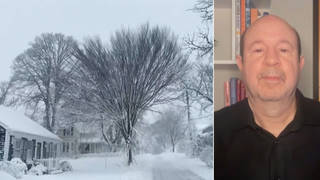
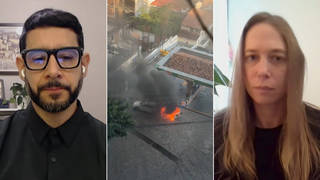
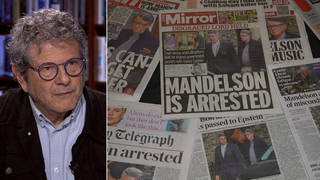
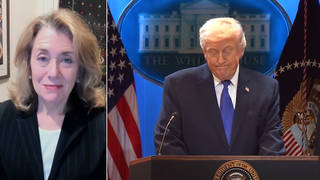






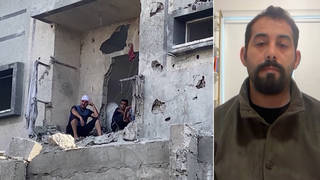
Media Options